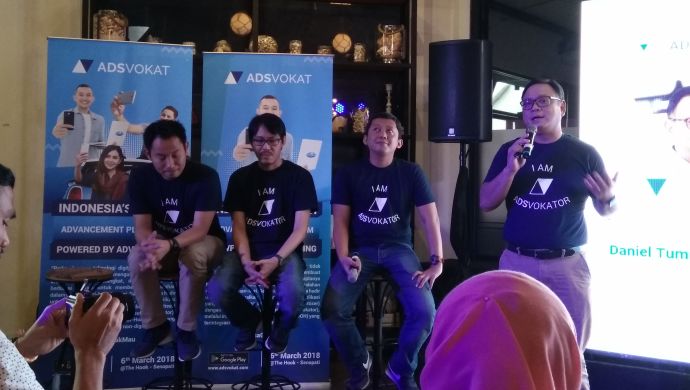ADSvokat helps brands reach out to customers by turning students into brand ambassadors. All they need is a laptop, a smartphone, or a helmet

Left to right: ADSvokat co-founders Andre Halomoan (Chief Products Officer), Heru Herlambang (CTO), Achmad Moesadad Shatarie (COO), and Daniel Tumiwa (CEO)
After leaving the company in May 2016, former OLX Indonesia CEO Daniel Tumiwa was looking for inspiration to start a new business when he noticed the stickers on cafe visitors’ laptops, the pins on fellow commuters’ backpacks, and the empty spaces on the helmet of ojek drivers.
“These are all very effective medium [for brands to convey their messages in],” he says, stressing how during peak hours people may spend quite a long time staring at these objects.
Seeing an exciting opportunity, together with Andre Halomoan (Chief Products Officer), Heru Herlambang (CTO), and Achmad Moesadad Shatarie (COO), Tumiwa then co-founded ADSvokat, which had just been launched in South Jakarta on Tuesday.
The adtech startup works in a similar way as startups such as Sticar or PayRide, which enables car or motorbike owners to make money by having brands advertise on the body of their vehicles.
But ADSvokat is taking the concept a little bit further. Not only that it allows brands to advertise on customers’ vehicle, it also allows them to advertise on their clothes, smartphones, and helmets.
Also Read: Adtech company Eyeota raises US$12.5M in Series B financing to expand in APAC
To use the service, customers start by registering themselves to the platform, which is available in the form of a mobile app for Android devices.
Once approved, customers will be able to pick the brands that they like on the ADSvokat platform; they can even request for their favourite brands if it is not yet available on the platform.
Customers will then be given stickers containing the company’s logo, hashtag, or jargon, and they will have the option of putting them on the back of their car, their helmet, or even on their laptop and smartphone.
Once the customer begins riding their vehicles, or turning on their laptop, they can check-in to the mobile app and it will start counting the impression that the sticker has left, which may varied depending on location and distance.
Customers also have the option to turn themselves into a “human billboard” by wearing T-shirt or hoodie with the brand’s logo on it.
They will also be given the options to take selfie with the stickers, or to tell their friends about the brand, which can help them earn even more money.
Tumiwa explains that this model aims to solve the issue faced by brands when using traditional medium of advertising, such as billboards.
Also Read: Adtech startup DREA claims it enables SMEs to reach target clients in 60 seconds, raises funding
In addition to the inability to measure the impression that ads have left, billboards are also a one-way communication platform that does not involve customers in conveying the messages of their favourite brands.
“We are providing a platform that stands between customers who are into a certain brand, and brands who want to communicate, and even turn their customers into micro-ambassadors,” Tumiwa says.
“In our everyday life, we already have the habit of sharing our satisfaction of a product to our friends … Three-fourth of transactions done by the Millennial generation also happened as the result of a friend’s recommendation. Millennials are very critical of advertising. For them, the more a brand advertises, the more suspicious it looks. But when it is recommended by their own friends, they are willing to give it a try,” he continues.
Interestingly, ADSvokat is targetting university students as their users. Not only that the students can make money by joining the platform, they can also participate in self-development workshops and read educational contents on the mobile app.
ADSvokat is also planning to host annual youth conferences for the university students on their platform.
Also Read: 4 ways blockchain will disrupt the traditional adtech ecosystem
Since July 2017, ADSvokat has tested its service –under the pseudonym of “Project X”– to 4,000 students, with half of them already becoming daily active users (DAUs).
By far, the South Jakarta-based startup already has four brands on board, from Unilever-owned shampoo brand Clear, banking giant BCA’s e-wallet app Sakuku, state-owned mobile operator Telkomsel’s Loop service, and e-commerce unicorn Tokopedia.
It aimed to secure 60 repeat clients and 60,000 DAUs by the end of the year.
Also in 2018, the startup is also aiming to raise its Series A funding round, after being run through bootstrapping since its founding.
The post Meet ADSvokat, the Indonesian startup that will help you make money from the sticker on your laptop appeared first on e27.